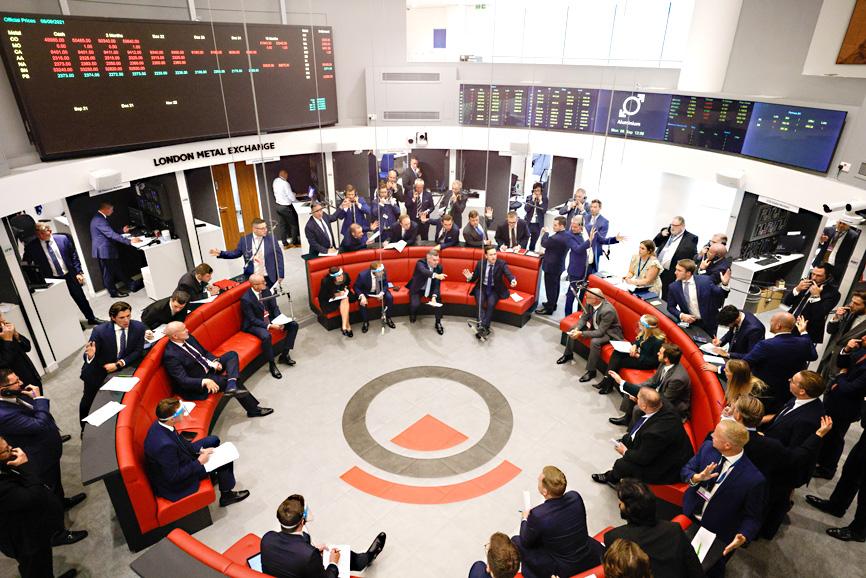The UK Financial Conduct Authority (FCA) and Bank of England are to review the governance, market oversight and risk management of the London Metal Exchange (LME) after a massive short squeeze led to weeks of turmoil that paralyzed the nickel market.
The exchange suspended nickel trading on March 8 after prices spiked by 250 percent in little more than 24 hours. It then canceled billions of dollars of trades that had occurred, arguing that not doing so would have led to multiple defaults.
The FCA is to review the suspension and resumption of the nickel market, while the central bank would review the operations of LME’s clearing house, they said in a joint statement yesterday.

Photo: Bloomberg
The exchange separately said it would appoint an independent party to conduct its own review into the events, including “a full forensic review of trading” that could lead to disciplinary action, as well as considering potential measures for market reform.
The UK regulators are also to engage with firms who held significant positions in the market to assess the effectiveness of their risk management and governance during the period, the regulators said.
Last month’s short squeeze was focused on Chinese tycoon Xiang Guangda (項光達) and his company, Tsingshan Holding Group Co (青山控股), which built up a giant bet on lower nickel prices and faced billions of dollars in losses when the market spiked higher. Tsingshan held its position through about 10 banks and brokers, including JPMorgan Chase & Co, Standard Chartered PLC and BNP Paribas SA.
The exchange has been criticized by investors for its handling of the crisis.
The LME said that the price spike posed a systemic risk to its market, while the decision to cancel several hours of trades at the highest prices served as a bailout of Tsingshan and its banks to the tune of several billion dollars.
“The FCA intends to review the LME’s approach to managing the suspension and resumption of the market in nickel to determine what lessons might be learned in relation to the LME’s governance and market oversight arrangements,” the statement said.
The FCA is responsible for supervision of the LME as an investment exchange, while the Bank of England’s Prudential Regulation Authority is responsible for supervision of LME Clear.
The regulators also called for the appointment of so-called skilled persons — typically consultants — to conduct a section 166 review.
Historically, the FCA has tended to leave most of the big decisions and policing of market abuse to the exchange. The last major enforcement action taken by the FCA (or its predecessors) against a company over its activities on the LME was more than two decades ago, in the wake of the Sumitomo copper scandal.
Separately, the LME said it plans to increase transparency in its markets by forcing members to disclose off-exchange “over-the-counter” (OTC) positions with their clients. It has been doing this in nickel since the middle of last month, but would extend it to all metals.
The OTC market has come under growing focus following the nickel squeeze, as Xiang held most of his positions off the exchange.
The LME said it had “no visibility” of the large OTC short position in the nickel market prior to March 8.
The LME has also agreed to “strengthen its governance” by appointing additional independent directors, the regulators’ statement said.

The Eurovision Song Contest has seen a surge in punter interest at the bookmakers, becoming a major betting event, experts said ahead of last night’s giant glamfest in Basel. “Eurovision has quietly become one of the biggest betting events of the year,” said Tomi Huttunen, senior manager of the Online Computer Finland (OCS) betting and casino platform. Betting sites have long been used to gauge which way voters might be leaning ahead of the world’s biggest televised live music event. However, bookmakers highlight a huge increase in engagement in recent years — and this year in particular. “We’ve already passed 2023’s total activity and

Nvidia Corp CEO Jensen Huang (黃仁勳) today announced that his company has selected "Beitou Shilin" in Taipei for its new Taiwan office, called Nvidia Constellation, putting an end to months of speculation. Industry sources have said that the tech giant has been eyeing the Beitou Shilin Science Park as the site of its new overseas headquarters, and speculated that the new headquarters would be built on two plots of land designated as "T17" and "T18," which span 3.89 hectares in the park. "I think it's time for us to reveal one of the largest products we've ever built," Huang said near the

China yesterday announced anti-dumping duties as high as 74.9 percent on imports of polyoxymethylene (POM) copolymers, a type of engineering plastic, from Taiwan, the US, the EU and Japan. The Chinese Ministry of Commerce’s findings conclude a probe launched in May last year, shortly after the US sharply increased tariffs on Chinese electric vehicles, computer chips and other imports. POM copolymers can partially replace metals such as copper and zinc, and have various applications, including in auto parts, electronics and medical equipment, the Chinese ministry has said. In January, it said initial investigations had determined that dumping was taking place, and implemented preliminary

Intel Corp yesterday reinforced its determination to strengthen its partnerships with Taiwan’s ecosystem partners including original-electronic-manufacturing (OEM) companies such as Hon Hai Precision Industry Co (鴻海精密) and chipmaker United Microelectronics Corp (UMC, 聯電). “Tonight marks a new beginning. We renew our new partnership with Taiwan ecosystem,” Intel new chief executive officer Tan Lip-bu (陳立武) said at a dinner with representatives from the company’s local partners, celebrating the 40th anniversary of the US chip giant’s presence in Taiwan. Tan took the reins at Intel six weeks ago aiming to reform the chipmaker and revive its past glory. This is the first time Tan